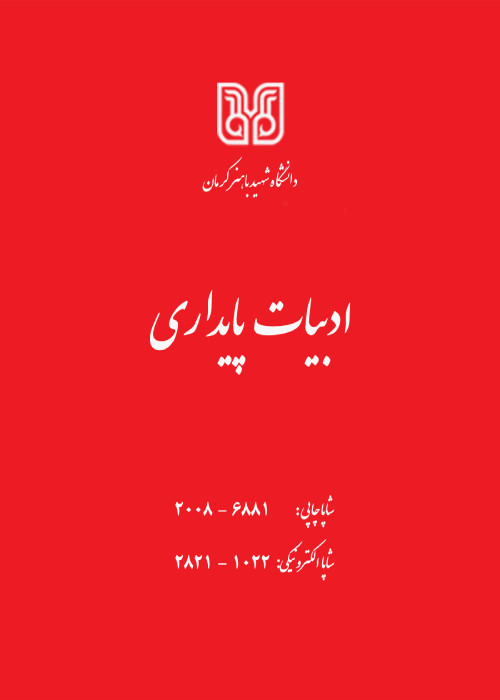An Investigation of Mokhtarnameh Poem Collections in Persian Literature
Religious epic collections have less been the focus of scholars, despite the fact that a high number of them exist in Persian. Perhaps one of the reasons may be that they are not well recognized among the literati. During the history of Persian literature, various religious epic collections have existed with different subjects, like special religious events, the wars of the beginning of Islam, the biography and life style of religious clergymen and other recognized religious figures. One of the subjects that religious literati had special attention to is Mokhtar Ibn-e Abi Obeydeh Thaqafi’s biography and retellings about his uprising to avenge the Karbala catastrophe and its martyrdoms. In these religious collections, Mokhtar’s uprising and his persistence in getting his revenge from the murderers of Imam Hossein has been depicted through epic poetics and in imitation of Ferdowsi’s Shahnameh. Most of these collections are manuscripts that are kept in libraries. The aim of this study was to present a general introduction to Mokhtarnameh collections in Persian literature through library research and documentation. In this study, four religious epic collections on the uprising of Mokhtar Thaqafi were introduced, among which Negahi Arani-Kashani’s Mokhtarnameh was the oldest, dated back to the tenth century A.H. Key words: Poem collection, Religious epic, Mokhtarnameh, Mokhtar Thaqafi
In terms of the type of hero and subject matter, epic is divided into four categories: national and mythological, historical, religious and mystical. Among these four categories of epic, poetic religious epics will be discussed in this article. Poetic religious epics are works that describe the religious events in the form of Mathnavi in a narrative way. Some of the poem collections mentioned in this study still exist in literary form in libraries. Introducing them can provide an appropriate context for the correction and research, and it can also provide the public with the scientific, literary, historical and religious benefits of epics. Furthermore, it is important to examine the content of these works from the perspective of resistance literature.
The method used in this article is based on library and document research. Little information exists in the sources and lists about the poem collections mentioned in this study, and it was not possible for the author to see the existing manuscripts to complete the existing information. Therefore, the data pertaining to each poem collection are based on limited resources. Some of the poems that narrate Mukhtar's story exclusively describe Mukhtar's uprising and are often published under the general title 'Mokhtarname'. Others deal with the narration of Karbala happenings, and they end with a description of Mukhtar's uprising to take revenge on the killers of the martyrs of Karbala, e.g., Elham Kermanshahi's Ferdows Garden and Reza Qolikhan Hedayat's Manhajalehdaya. In the present study, we will only introduce the first group.
According to the information obtained from sources and book lists, since the 10th to the 14th century AH, fifteen Mokhtarnamehs were written by Persian-speaking poets of Iran and the subcontinent, from which Arani Kashani's Mokhtarnameh written in poem in the 10th Century is the oldest as well as the most recognized one. If Makhzanol Dorrar’s claim that Qatreye Isfahani’s Mokhtarname contains 104,000 verses is not true, it is likely that Jafari's Mokhtarname that is known to have a thickness of Ferdowsi's Shahnameh, is the largest Mokhtarnameh introduced in this research. Then comes the Mokhtarnameh of Yazdi's Burhanpuri and Khamoosh Yazdi in the second place with a volume of about thirty thousand verses. 'Ronaghe Anjuman' by Sohbat Lari is the smallest poem collection with almost 1800 verses. The contribution of Persian-speaking poets of the subcontinent on poeticizing Mokhtarnameh is also noticeable, and about half of these poem collections have been written by these poets.
This study aims to introduce the poems that depict the story of the uprising of Mokhtar Ibn-e Abi Obeydeh Thaqafi in an epic style. These poems and their poets are often unknown and neglected. The Mokhtarnamehs of Salem Sabzevari in the 11th Century, Mirza Arjmand Azad Kashmiri (Delgoshanameh), Mirza Abotrab Esfahani, Burhanpuri, Ghane Tatwi and anonymous poet in the 12th Century, and Sohbat Lari's poems (Ronaghe Anjuman), Tamkin Shirazi (Nishat Al-Qolub), Ja'fari, Maftoon Danbali (Homayoun-Namah), Qatre Esfahani (Fatahnameh of Mokhtar), and Mirza Abdul Rahim Nayini (Bahjah al-Mu'minin) in the thirteenth century were poeticized. The Shoayi Qajar and Khamosh Yazdi’s Mokhtarnames also belong to the 14th century AH. Thus, the twelfth and thirteenth centuries A.H. is the peak of Mokhtarnameh writing. The poems that have a copy now are all composed in the form of Mathnawi and Bahre Moteqareb, imitating Ferdowsi's Shahnameh. Apparently, only Sohbat Lari's poems (Ronaghe Anjuman) has been published in print, and other manuscripts are kept in form of handwritten manuscripts in libraries.
- حق عضویت دریافتی صرف حمایت از نشریات عضو و نگهداری، تکمیل و توسعه مگیران میشود.
- پرداخت حق اشتراک و دانلود مقالات اجازه بازنشر آن در سایر رسانههای چاپی و دیجیتال را به کاربر نمیدهد.


